|
|
|
Sort Order |
|
|
|
Items / Page
|
|
|
|
|
|
|
| Srl | Item |
| 1 |
ID:
130024
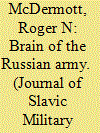

|
|
|
|
|
| Publication |
2014.
|
| Summary/Abstract |
Following the Russia-Georgia War in August 2008, Russia's conventional Armed Forces were subjected to a far reaching and unpredictable reform. Although the Armed Forces were long overdue reform, previous efforts rapidly failed for a variety of reasons including institutional inertia, in-fighting within the military elite and a lack of consensus on the goals and targets of such reform. The reforms of 2008-12 were therefore unprecedented since the creation of Russia's Armed Forces in 1992 following the disintegration of the USSR in late 1991; major changes were actually implemented. Yet, the reforms that followed were haphazard, poorly implemented and frequently experienced setbacks, reversals and an overall lack of coordinated policy efforts. These issues are examined in the following paper, exploring the roots of Russian defense planning weaknesses, and the numerous policy zigzags of the reforms to the structure of the Armed Forces, officer downsizing, NCO development and many other issues within a political-military culture that actually mitigates time-phased and fully worked-out planning cycles. Moscow's blindness to the utility of reliable military statistics will ensure continued 'blind planning' and institutional guesswork until obsessive secrecy and state level corruption give way to more scientific approaches to forming, implementing and managing such strategic level change within the country's defense and security structures.
|
|
|
|
|
|
|
|
|
|
|
|
|
|
|
|
| 2 |
ID:
130036


|
|
|
|
|
| Publication |
2014.
|
| Summary/Abstract |
This study explores Russian thoughts and deeds that have evolved since the mid-1990s about regional nuclear deterrence and about the role of non-strategic nuclear weapons in it. The article argues that during the last two decades doctrinal postulates related to regional deterrence have not always been supported by actual assets, several capabilities have been existing in a conceptual vacuum, and several nuclear industry initiatives have been disconnected from official policy. The article suggests an explanation why ends, means and ways of 'regional deterrence' are not always calibrated among different parts of the Russian strategic community.
|
|
|
|
|
|
|
|
|
|
|
|
|
|
|
|
| 3 |
ID:
130026
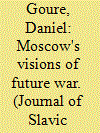

|
|
|
|
|
| Publication |
2014.
|
| Summary/Abstract |
Like the United States and NATO, Russia is struggling to define the future security environment and shape a course to the creation of a relevant and effective military. Russia's strategic vision is of an uncertain, complex and quite dangerous word with threats ranging from internal subversion through intercontinental nuclear exchanges. The Russian military faces an impossible dilemma. It must address a broadening spectrum of prospective conflict scenarios with inadequate resources leading inevitably to the fielding of inadequate capabilities. One reason that Russia clings so tenaciously to nuclear weapons is its recognition that it is the nation's central, even the sole, source of political relevance and military power.
|
|
|
|
|
|
|
|
|
|
|
|
|
|
|
|
| 4 |
ID:
130034
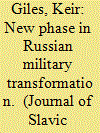

|
|
|
|
|
| Publication |
2014.
|
| Summary/Abstract |
Fundamental reform of Russia's military has passed through a number of distinct phases since its inception in late 2008. This paper describes the phase of consolidation and stability begun in early 2011. Based on research to June 2012, and pre-dating the replacement of Anatoliy Serdyukov as Russian Defence Minister, the paper shows how early planning and forecasting deficiencies were addressed from 2011 onward, with continuing support at the highest level for the overall aims of military reform. Ongoing problems such as procurement and manpower are discussed as serious challenges to Russian military aspirations, and further specific challenges affecting each individual arm of service are described. In conclusion, Russia's new military capabilities, and the state's rationale for introducing them, are considered.
|
|
|
|
|
|
|
|
|
|
|
|
|
|
|
|
| 5 |
ID:
130033
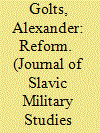

|
|
|
|
|
| Publication |
2014.
|
| Summary/Abstract |
Two years ago president Dmitry Medvedev and Minister Anatoly Serdyukov stated that military reforms are 'practically' complete. It looks premature now. Serdyukov managed to fulfill only 'quantitative' part of reforms. The 'Serdyukov' reforms will follow the path typical of the majority of Russian reforms. They focus on meeting certain formal measures and characteristics (in the case of military reform, this includes the size of the armed forces, the number of units, the new structure and so on) and, at the same time, avoid making decisions that would require radical changes in the country's political and social life.
|
|
|
|
|
|
|
|
|
|
|
|
|
|
|
|
| 6 |
ID:
130023
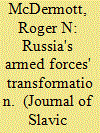

|
|
|
|
|
| Publication |
2014.
|
| Summary/Abstract |
Since the creation of the Armed Forces of the Russian Federation in 1992, the Kremlin has grappled, struggled or even procrastinated on addressing the question of what type of force structure may best suit the state's security environment. A number of initiatives frequently represented as 'reform' have come and gone, falling by the wayside due to internal inertia, institutional resistance to root and branch reform or, indeed, as a result of the political-military elite failing to come to terms with the disintegration of the Soviet Union. Transitioning from the Soviet legacy force to something more akin to the forces needed to protect the Russian state and adapt to the modern warfare environment to meet a number of differing challenges ranging from counterinsurgency to peacekeeping or dealing with an unforeseen military crisis plagued Moscow's defense planning.
|
|
|
|
|
|
|
|
|
|
|
|
|
|
|
|
| 7 |
ID:
130030
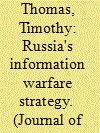

|
|
|
|
|
| Publication |
2014.
|
| Summary/Abstract |
This article discusses new developments in Russia's information and cyber warfare concepts. It updates information based on old paradigms and introduces several new developments that are influencing the current paradigm. It examines the potential shape of Russia's cyber strategy and offers a prediction as to how they might 'cyber cope' in future conflict.
|
|
|
|
|
|
|
|
|
|
|
|
|
|
|
|
| 8 |
ID:
130025


|
|
|
|
|
| Publication |
2014.
|
| Summary/Abstract |
In 2012 Vladimir Putin pledged that Russia would over the next decade invest in a smart defense, embracing new technologies to modernize its conventional forces and its strategic nuclear arsenal to ensure strategic stability in Eurasia. At the core of the demands for Russian military modernization is a very pessimistic appraisal of the current capabilities of Russia's conventional forces and the future deterrence power of its strategic nuclear forces in the face of emergence US ballistic missile defenses and global precision-strike conventional systems. Driving the Russia's notion of future war is threat environment that is complex and raises risks of local crises leading to foreign military intervention. These threats include a persistent terrorism within its own territories and Central Asia, an ideological fear of psychological subversion from the "color revolutions" of the last decade, the geopolitical threat of NATO expansion into Post-Soviet territory, and the stated fear that US military modernization will undermine the credibility of Russia's conventional and nuclear forces. Finally, in spite of the Sino-Russian strategic partnership, there is also an unspoken fear that an emergent China could some day become a threat to Russia's Eastern Siberia and the Far East.
|
|
|
|
|
|
|
|
|
|
|
|
|
|
|
|
|
|
|
|
|